Marchés
Lors de la conception d’une intervention humanitaire et de la prise de décisions quant à l’utilisation des transferts monétaires, l’analyse générale des options de réponse doit inclure une analyse de marché. Il est prouvé qu’offrir un soutien ciblant le fonctionnement des marchés accélère la reprise et accroît la résilience dans les zones affectées par une catastrophe.
De nombreuses organisations ont investi dans la mise au point d’outils visant à faciliter l’analyse de marché et réfléchissent à la mise en place de programmes basés sur les marchés plus holistiques. Elles envisagent des interventions tirant profit du marché (basées notamment sur des transferts monétaires aux populations affectées), ainsi que des interventions soutenant directement les marchés (comme l’octroi de subventions conditionnelles aux vendeurs/euses pour la remise en condition du marché).
Initiatives associées
Contenu associé

1.2 Introduction à l’analyse de marché
Cours
Ce cours de 30 minutes offre une introduction à l’analyse de marché pour les contextes d’urgence. Il contient des contributions d'experts dans ce domaine. Ce cours a été développé en collaboration avec l'International Rescue Committee et le CALP Network et grâce au financement d’USAID/OFDA et de l’Agence Suisse pour le Développement et la Coopération. Il est destiné aux...

2.4 Un guide pratique pour l’analyse de marché
Cours
Ce cours en ligne de 3.5 heures vise à fournir aux équipes qui conduiront des analyses de marchés en contextes humanitaires une compréhension approfondie de la théorie et des étapes à suivre afin de leur permettre de comprendre le pourquoi et le comment du processus à suivre. Les participants seront guides à travers un scenario d'analyse de marchés d'urgence. Ce cours s'appuie sur...
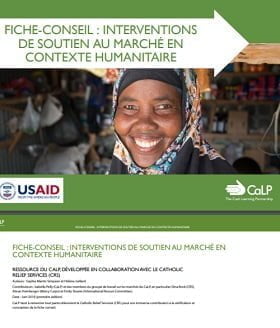
Fiche-Conseil : Interventions de soutien au marché en contexte humanitaire
Guides et outils
La fiche conseil définit le programme de soutien au marché en contexte humanitaire et le décrit dans la pratique. Elle permet aux praticiens humanitaires d’envisager systématiquement des interventions de soutien au marché, parallèlement à d’autres activités du programme. Le champ d’application comprend des interventions de soutien au marché axées sur l’offre/la disponibilité...
Thematic lead
Latest

Market Analysis and Outcome/Impact Measurement in Cash Transfer Programming in the WaSH and Shelter Sectors in Sudden Onset Disasters
Report
Over the past five years, cash transfer programming has become an increasingly popular modality of humanitarian intervention. Recently, unconditional and unrestricted MPGs have been increasingly championed as a default modality, based on evidence collected by organisations such as the...
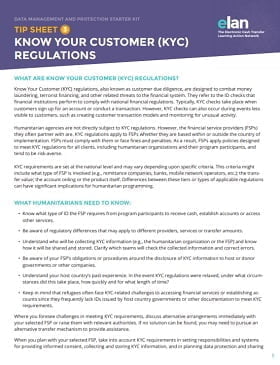
Data management and protection starter kit: Tip sheet 3: Know your customer (KYC) Regulations
Guidelines and Tools
Know Your Customer (KYC) regulations, also known as customer due diligence, are designed to combat money laundering, terrorist financing, and other related threats to the financial system. They refer to the ID checks that financial institutions perform to comply with national financial regulations....
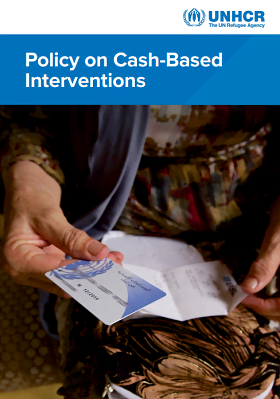
Policy on Cash-Based Interventions
Report
UNHCR’s Policy on Cash-Based Interventions (CBIs) is introduced herewith to expand and systematise the use of CBIs as a modality of assistance and service delivery across the organization and its operations worldwide. The Policy reconfirms UNHCR’s commitment to the increased use of CBIs and sets out...

Revised Pre-Crisis Market Analysis (PCMA)
Guidelines and Tools
The purpose of this guidance is to provide field practitioners, across the different sectors, with a practical step-by-step process of how to plan, carry out, and update pre-crisis market mapping and analysis, leading to response/programme design and implementation as well as surveillance, early...

Appropriateness and Impact of Cash Grants Distribution in Eastern Ukraine
Case Study
This programming note assesses the appropriateness and impact of cash grants distribution in Eastern Ukraine. Key findings Distribution of cash grants of US$250 – US$900 via bank transfer allowed beneficiaries to purchase or pay for a wide variety of items or services, including food, medication or...

Global Shelter Cluster Position Paper: Cash & Markets in the Shelter Sector
Presentation
The use of direct cash payments to support communities impacted by crisis is becoming increasingly commonplace as a response to humanitarian situations – and with good reason. Cash can often be faster and more cost-efficient to deliver than in-kind assistance and most importantly increases choice,...

Cash/Food. A Comparative analysis of the effectiveness of food assistance modalities in refugee settlements
Report
A comparative analysis of the effectiveness of food and cash assistance modalities for household food security in refugee settlements

Genre et Marchés en Afrique de l’Ouest: Revue des Données Secondaires
Rapport
L’examen secondaire de l’information et des données présentées dans cette revue s’applique aux évaluations genre et marchés menées par le PAM en Afrique de l’Ouest et ainsi qu’aux évaluations de marché menées par les partenaires clés de la région au cours des 5 dernières années. La...

The Revival of the “Cash versus Food” Debate: New Evidence for an Old Quandary?
Report
The longstanding “cash versus food” debate has received renewed attention in both research and practice. This paper reviews key issues shaping the debate and presents new evidence from randomized and quasi-experimental evaluations that deliberately compare cash and in-kind food transfers in ten...

Using Cash for Shelter: An Overview of CRS Programs
Report
Cash continues to gain prevalence as a modality for humanitarian agencies to help people meet multiple and diverse needs in the wake of a crisis. It provides people with the dignity of choice, and is often significantly more cost-efficient than the delivery of in-kind aid. In programs with a shelter...
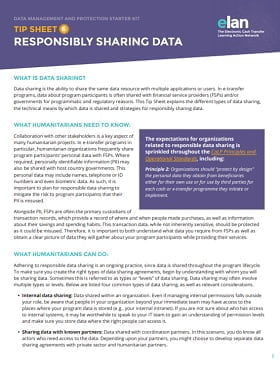
Data management and protection starter kit: Tip sheet 6: Responsibly Sharing Data
Guidelines and Tools
Data sharing is the ability to share the same data resource with multiple applications or users. In e-transfer programs, data about program participants is often shared with financial service providers (FSPs) and/or
governments for programmatic and regulatory reasons. This Tip Sheet explains the different...
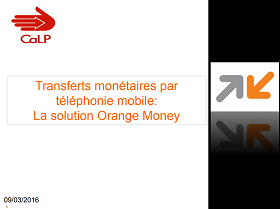
Transferts monétaires par téléphonie mobile: La solution Orange Money
Rapport
Une nouvelle forme de monnaie dont l’utilisation se fait exclusivement
avec le téléphone portable
Une effervescence avec plusieurs offres ( mpayments, mwallets,…) et
plusieurs solutions technologiques (USSD, Web,…)
Un fort potentiel en Afrique à cause du faible taux de bancarisation et un
bel...

The Impact of Earned and Windfall Cash Transfers on Livelihoods and Conservation in Sierra Leone
Report
This study by Bulte et al. measures the impact of a cash transfer programme aimed at alleviating poverty and reducing pressure on the natural environment in Sierra Leone. Researchers offered aid to 91 rural communities, which are dependent on slash-and-burn agriculture in three forms: as windfall...
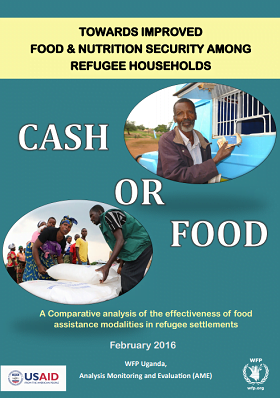
Cash or Food A Comparative analysis of the effectiveness of food assistance modalities in refugee settlements
Report
A comparative analysis on the effective of food and cash transfer modalities for household food security in refugee settlements in Uganda.

ELAN Workshop Report: E-Transfers in Iraq and Syria
Report
This report outlines the main conclusions and takeways of ELAN workshop held in Iraq. The event was organized to meet the following objectives: Introduce participants to the what, why, and when of e-transfers. Explore solutions to the particular challenges of using e-transfers in Iraq and Syria. Share...
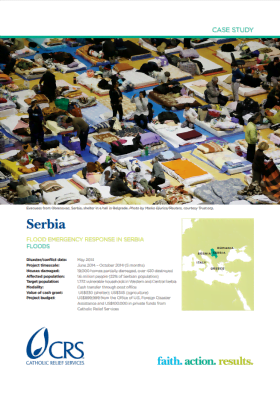
Using Cash for Shelter: Flood Emergency Response in Serbia
Case Study
The devastating floods that affected the Balkans in May 2014 affected 1.6 million people, 22 percent of Serbia’s population, and have set the country’s economic development back decades. Catholic Relief Services (CRS) conducted rapid assessments in 13 villages in the municipalities of Šabac, Valjevo,...
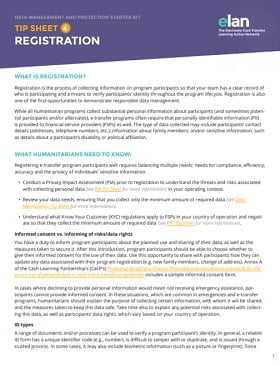
Data management and protection starter kit: Tip sheet 4: Registration
Guidelines and Tools
Registration is the process of collecting information on program participants so that your team has a clear record of who is participating and a means to verify participants’ identity throughout the program lifecycle. Registration is also one of the first opportunities to demonstrate responsible data...

What to know: working with humanitarians on e-cash programs
Report
International humanitarian assistance rose to a record US$24.5 billion in 2014. The 2015 Global Humanitarian Assistance Report indicated that over US$200 million of this was used in cash and voucher programs. An increasing number of humanitarian actors have begun to deliver cash electronically, through...

International Cash based assistance
Report
For more than 60 years, the United States provided assistance to food-insecure countries primarily in the form of food commodities procured in the United States and transported overseas. In recent years, the U.S.government has increasingly provided food assistance in the form of cash transfers or food...

ELAN Vocabulary and Usage
Guidelines and Tools
As e-transfer programs, technologies and products develop, key terms, phrases and working definitions are evolving alongside them. At the moment, these words and phrases are rarely standardized, and often hold unique meanings within different contexts and to different stakeholders. In order to facilitate...
